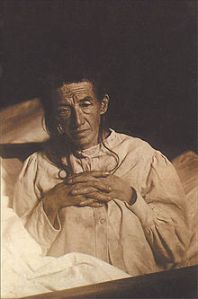About the disease
Alzheimer’s disease (AD) is the most common form of dementia among older people. Dementia is a brain disorder that seriously affects a person’s ability to carry out daily activities.
Alzheimer’s disease can be either sporadic or familial.
Sporadic Alzheimer’s disease can affect adults at any age, but usually occurs after age 65 and is the most common form of Alzheimer’s disease.
Familial Alzheimer’s disease is a very rare genetic condition, caused by a mutation in one of several genes. The presence of mutated genes means that the person will eventually develop Alzheimer’s disease, usually in their 40’s or 50’s.
The Brain with Alzheimer’s disease
 . Dr Alzheimer’s patient, (MRS DETER)
. Dr Alzheimer’s patient, (MRS DETER)
Going back to the 1900s, Dr Alzheimer examined the brain of his patient, Mrs Deter, upon her death. He found shrinking of the outer layer of the brain or cortex – the region of the brain involved in memory, language and judgment. We know that the so called shrinking of the brain is caused by the death of the brain cells. Dr Alzheimer also found two types of deposits in Deter’s brain. One kind was found outside the brain cells, which are known plaques and the other type of deposit was found inside brain cells known as “neurofibrillary tangles. These plaques impair synapses so signals cannot pass between brain cells. Tangles kill brain cells by preventing the normal transport of food and energy around the brain cell. As brain cells die the brain shrinks, which can be detected using imaging such as magnetic resonance imaging (MRI).
Symptoms of Alzheimer’s disease
 . Ronald Reagan and Charlton Heston(were both diagnosed with Alzheimer’s)
. Ronald Reagan and Charlton Heston(were both diagnosed with Alzheimer’s)
In the early stages the symptoms of Alzheimer’s disease can be very subtle. However, it often begins with lapses in memory and difficulty in finding the right words for everyday objects.Other symptoms may include:
- Persistent and frequent memory difficulties, especially of recent events
- Vagueness in everyday conversation
- Apparent loss of enthusiasm for previously enjoyed activities
- Taking longer to do routine tasks
- Forgetting well-known people or places
- Inability to process questions and instructions
- Deterioration of social skills
- Emotional unpredictability, confusion, irritability, mood swings.
Symptoms vary and the disease progresses at a different pace according to the individual and the areas of the brain affected. A person’s abilities may fluctuate from day to day, or even within the one day, becoming worse in times of stress, fatigue or ill-health.
CAUSES
Genetics.
Other causes are being hypothized and some of the hypothesis are : Amyloid hypothesis, cholinergic hypothesis, Tau hypothesis. Please read more on these hypothesis on Wikipedia at http://en.wikipedia.org/wiki/Alzheimer%27s_disease
Then cardiovascular factors such as hypercholesterolaemia, hypertension, diabetes and smoking can cause an onset of Alzheimer’s Disease.
Prevention
Foods such as fruits, vegetables, bread, wheat, cereals, olive oil, fish, red wine may all or individually or together prevent Alzheimer’s disease.
Regular social Interaction
Intellectual activities such as chess, and Sudoku also.
Diagnosis
There is currently no single test to identify Alzheimer’s disease. The diagnosis is made only after careful clinical consultation.
The clinical diagnosis might include:
- A detailed medical history
- A thorough physical and neurological examination
- A test of intellectual function
- Psychiatric assessment
- A neuropsychological test
- Blood and urine tests
- Lumbar puncture for cerebral spinal fluid tests
- Medical imaging (MRI, PET)
You can read more about this disease at. http://www.fightdementia.org.au/services/library.aspx
11 thoughts on “Alzheimer’s Disease”